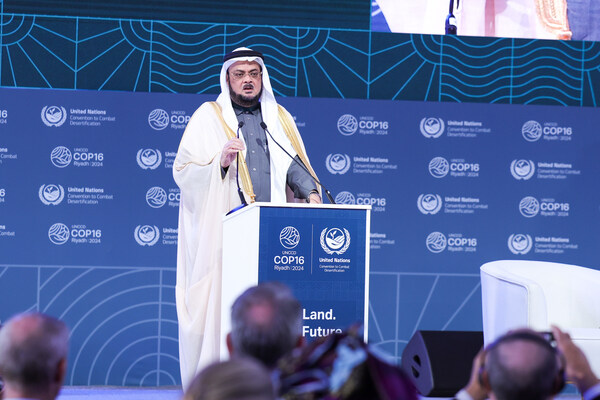Initiative launched during Agri-food System Day at COP16 in Riyadh
RIYADH, Saudi Arabia, Dec. 6, 2024 /PRNewswire/ — Saudi Arabia’s UNCCD COP16 Presidency has announced the launch of the Riyadh Action Agenda, a landmark initiative to mobilize state and non-state actors to deliver lasting solutions for land degradation, desertification and drought.
Dr. Osama Faqeeha, Deputy Minister for Environment, Ministry of Environment, Water and Agriculture, and Advisor to the UNCCD COP16 Presidency, officially launched the Riyadh Action Agenda during his keynote speech for the high-level interactive dialogue on sustainable, resilient and inclusive agri-food systems. The Riyadh Action Agenda will capitalize on the momentum created by COP16 in Riyadh, engaging with a range of key environmental stakeholders for the two-year duration of Saudi Arabia’s UNCCD COP16 Presidency, to foster tangible action for everyone from farmers to indigenous peoples.
Commenting on the announcement, Dr. Osama Faqeeha, said: “If we are to accelerate land restoration and drought resilience initiatives at the pace and scale required, then is it critical we continue to mobilize and incentivize action long after COP16 in Riyadh ends, reaffirming Saudi Arabia’s leadership in land restoration, and leaving a lasting legacy of global change.”
The launch of the Riyadh Action Agenda took place during the fourth day of COP16 in Riyadh, on Agri-food System Day, one of seven scheduled thematic days designed to focus discussions and ongoing negotiations. Agriculture is the primary driver of land degradation, with current agri-food systems contributing to deforestation, greenhouse gas emissions and biodiversity loss. According to the UNCCD, agriculture accounts for 23% of greenhouse gas emissions, 80% of deforestation, and 70% of freshwater use.
A range of events took place throughout the day to harness multilateral solutions to unsustainable agricultural practices. Discussions spanned an array of key meetings, with topics including ways to enhance healthy soils, resilient crops and nutritious food. Agri-food Systems Day also addressed the importance of private sector and farming participation in transforming food systems. The proceedings took place on World Soil Day, an annual global event advocating for sustainable soil management around the world.
“Around 95% of our food comes from the soil, and yet we continue to treat it like dirt. Unsustainable land management, farming practices and industrial-scale profiteering, are creating a simply unsustainable pace of land degradation, with every year 24 billion tonnes of fertile soil being lost. This is a leading cause of global food and water insecurity, impacting everyone from farmers toiling increasingly barren fields, to consumers paying more for essential goods,” said Dr. Faqeeha.
The UNCCD estimates that by 2050, crop yields could decline by 10% globally and 50% in the worst-hit regions. This scenario could cause an estimated 30% increase in food prices. Meanwhile, growing populations are forecast to increase demand on land and agriculture.
“We do not need to reinvent the wheel to deliver urgent solutions to the crises gripping our land and soils. Reinvesting harmful agricultural subsidies could almost immediately provide financial relief for land restoration and reform unsustainable practices,” added Dr. Faqeeha.
About COP16 Riyadh
The UNCCD COP16 conference is taking place from December 2-13, 2024, at Boulevard Riyadh World, Saudi Arabia. The conference, themed Our Land. Our Future, will mark the 30th anniversary of the UNCCD and aims to secure multilateral action on critical issues such as drought resilience, land tenure, and sand and dust storms.
For more information about UNCCD COP16, or to register your interest in attending the Green Zone please visit UNCCDCOP16.org











